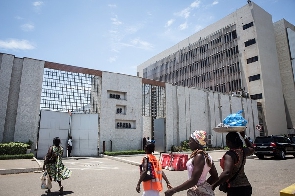 The Bank of Ghana Headquarters
The Bank of Ghana Headquarters
The Bank of Ghana (BoG) has said it is committed to preserving the safety and integrity of the payment and financial ecosystem in the face of the ongoing economic crisis.
Head of Fintech and Innovation at the central bank, Kwame Oppong, said the BoG has put in place a number measures to safeguard the burgeoning payments space against possible shocks, so as to consolidate the gains made so far. He added that the bank is constantly exploring innovations to maintain soundness of the financial sector, particularly in technology-driven financial solutions.
“Good governance arrangement has been a priority for the bank as it sets the tone, culture and manner in which we expect regulated payment service providers to operate. The BoG will continue to evolve its regulatory environment to preserve the safety, soundness and integrity of the payment and financial ecosystem,” he stated in a speech delivered on his behalf at the just-ended Mobile Technology for Development Conference (MT4D2023) in Accra.
He said the BoG remains resolute in ensuring a sound and robust payments market through the introduction of the regulatory sandbox in 2019, as well as the establishment of the FinTech and Innovation Office (FIO) in 2019. The FIO provides a platform for collaboration between the central bank, FinTech companies, and other stakeholders in the ecosystem.
The bank also introduced the Payment Systems and Services Act, 2019 (Act 987) to provide a legal framework for the regulation and oversight of payment systems and services in Ghana. The Act aims to promote innovation, competition, and consumer protection in the payment services industry.
The conference brought together experts from digital finance, agritech, digitised payments and academia to explore the challenges and solutions as well as the impact of digital finance.
Scaling up merchant acceptance
For her part, deputy Director of Payment Systems Department at the BOG, Clarissa Kudowor, called for innovative financial technological solutions to help scale-up merchant acceptance. Despite the successes within the domestic fintech industry which boasts of about 43 registered companies, she said there is still more work to be done to maximise the gains of digital financial inclusion.
“Digital technology is enhancing easy access to credit in novel ways. But, there is the need to further scale-up merchant acceptance through digital payments; this calls for innovative fintech solutions sensitive to the peculiar needs of diverse businesses,” she said, while speaking on the topic — driving digital and financial inclusion in our financial ecosystem.
Tech affordability gap must be addressed
Ghana’s internet penetration rate, according to the Digital 2023 Global Overview Report, stood at 53 percent of the total population at the start of 2022. The remaining 47 percent remained offline at the beginning of this year.
Against this backdrop, the deputy Minister for Communications and Digitalization, Ama Pomaa Boateng, urged all relevant stakeholders within the industry to work together to ensure cheaper technological devices and internet service for the informal sector.
“Our drive towards universal access to technology and digital inclusion is meaningless if we do not look at access and usage, especially for the majority of our people who are unable to afford it. In doing this, we must look at pricing to make sure it is affordable,” she said.
“Even though we are doing remarkably well by making data affordable, I still think there is some work to be done that will require a multi-stakeholder approach to drive our prices down,” she added.